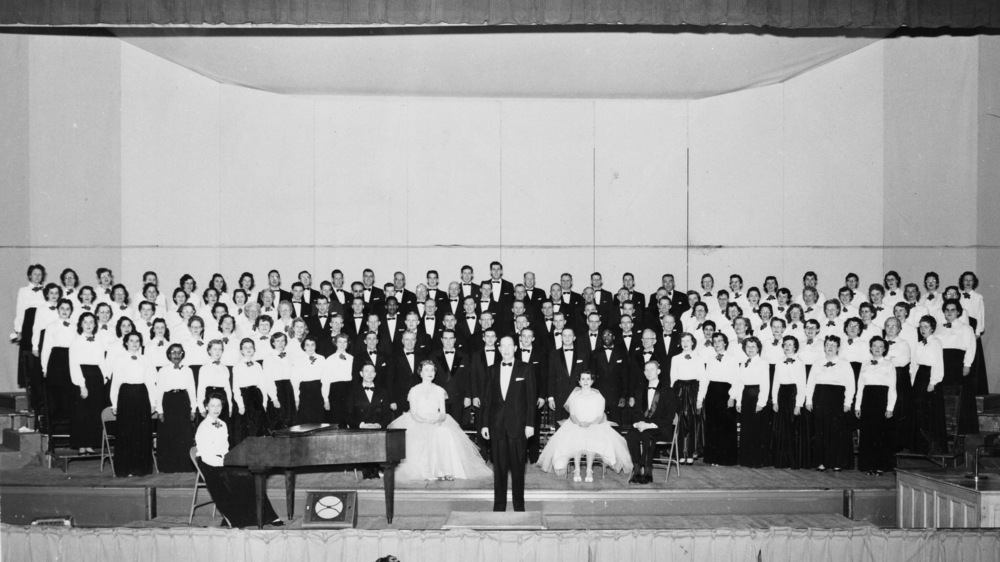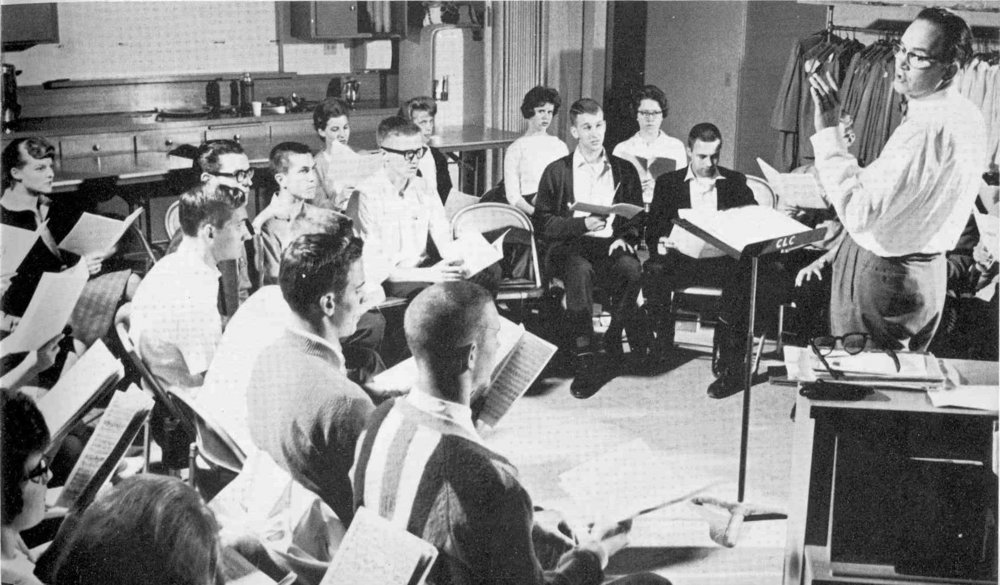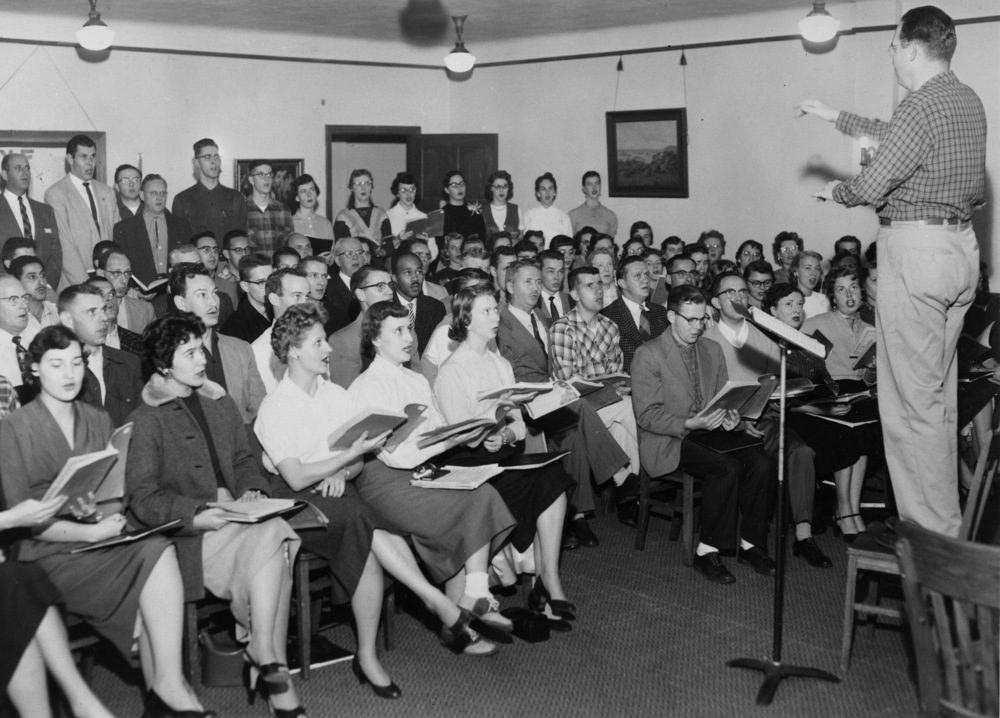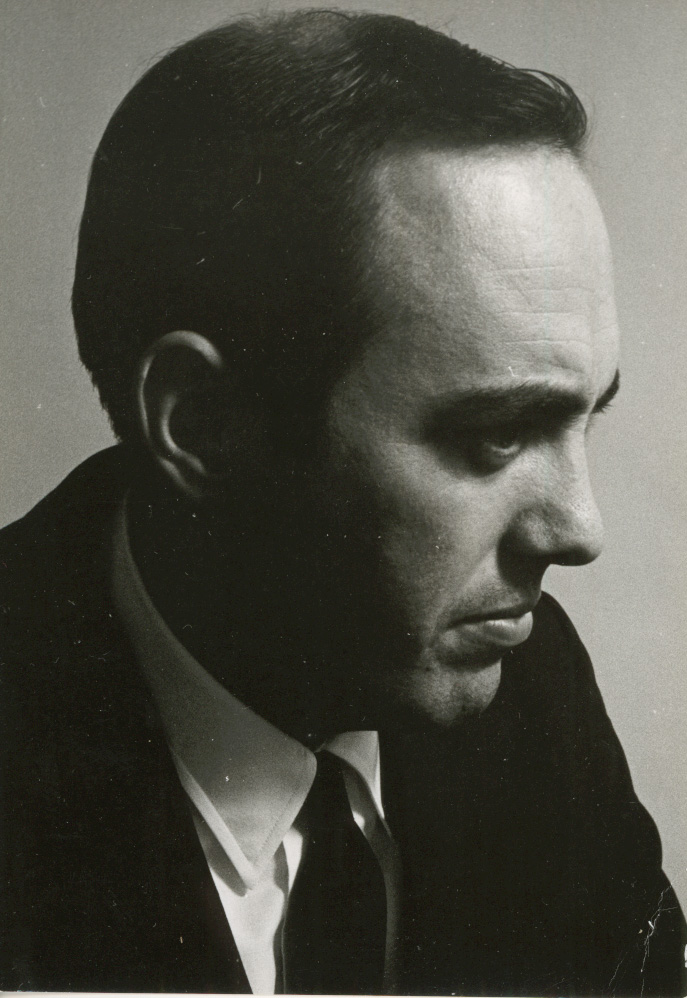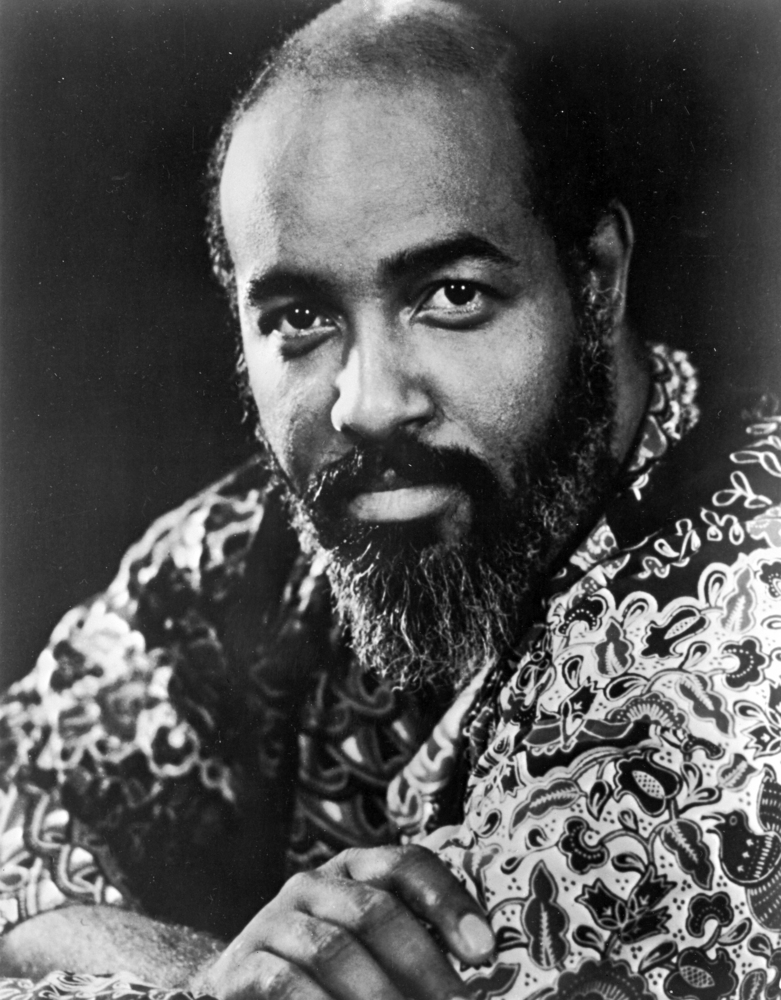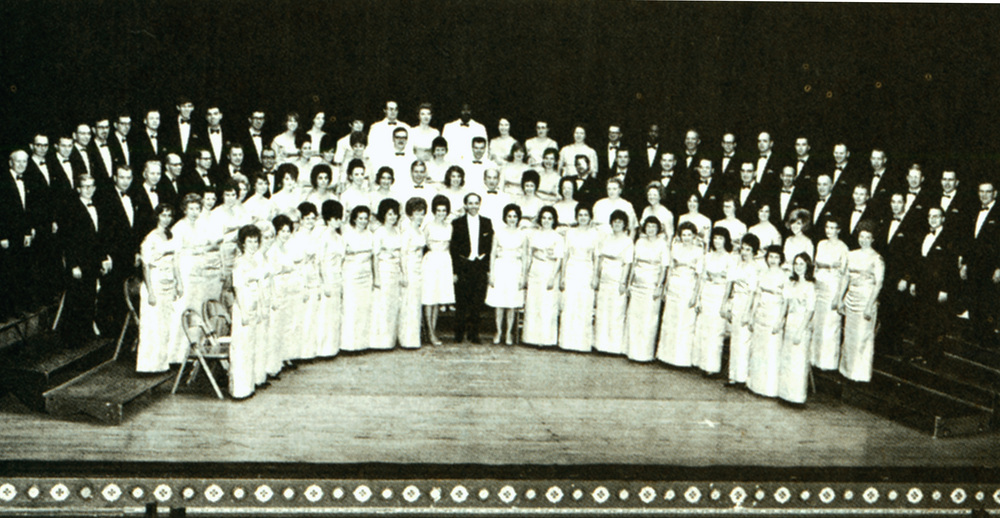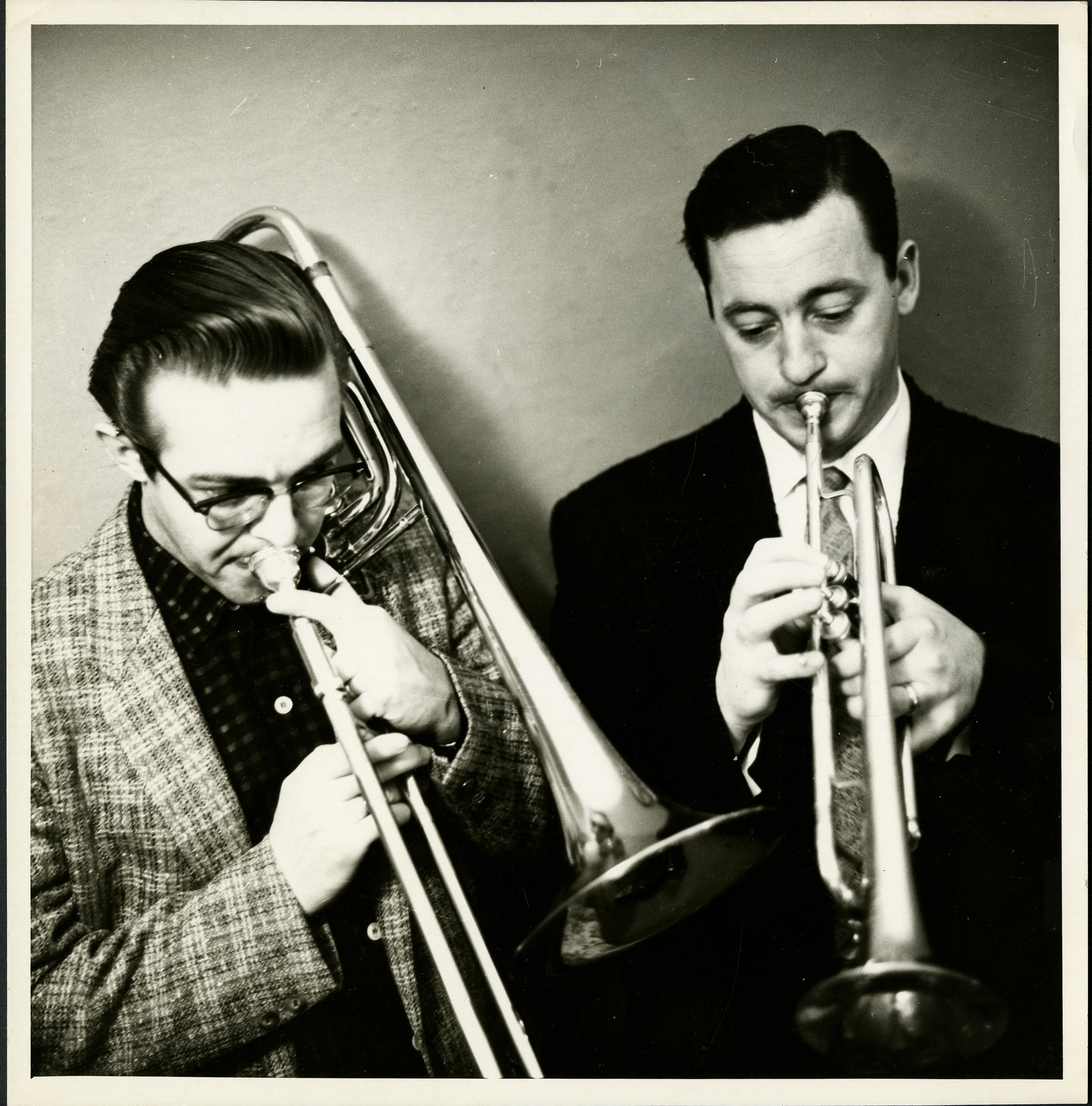Musician, teacher, conductor, and soloist C. Robert Zimmerman inspired a generation of singers and Portland audiences in the years following World War II. Born in the Philippines, Zimmerman grew up in rural Saskatchewan and eastern Washington. He earned a bachelor's degree from Washington State College in 1940 and taught high school in Spokane before moving to Portland in 1944 with his wife Janice. His vocal teacher in Portland was Mary Evelene Calbreath.
Zimmerman—whom singers knew as Bob Z and BZ—began his tenure in Portland as the music teacher at Lincoln High School (1944–1945). Within a year, he was educational music director for KGW Radio (1945–1947), had founded and was the director of the Portland Symphonic Choir (1945–1961), and was leading the choir at the Foursquare Church (1945–1947). He organized Men About Town, a male quartet that represented KGW at public events and on the air. He also taught music at the University of Portland (1948–1951), Catlin Gabel School (1956–1958), and Linfield College (1958–1961).
In 1947, in response to a review by Hilmar Grondahl that the Portland Symphonic Choir's spring 1946 concert emphasize short nonclassical works, Zimmerman's choir tackled the larger choral works implied in its name. "The Palm Sunday performance of Mozart's Requiem Mass...by the Symphonic Choir under direction of C. Robert Zimmerman," Grondahl wrote on March 31, "served to reveal once more the heavenly beauty of that music and the increasing artistic competence of the relatively young group who performed it."
In a 1947–1948 East Coast interlude, Zimmerman won scholarships to study conducting at Tanglewood and the Juilliard Institute at the invitation of Robert Shaw, a celebrated American choral conductor. He was one of the original members of the Robert Shaw Chorale, singing with the group in its 1948 and 1955 national tours and conducting the Chorale once.
In Portland, Zimmerman conceived the Holladay Bowl, an outdoor amphitheater built by volunteers at the Lloyd Center's southern edge, where he conducted fifteen light operas in the summers of 1952 to 1955. His Central Lutheran Church choir (1951–1958), which rehearsed twice a week and sang from memory, was unusually large, with as many as seventy singers.
Zimmerman collaborated with Dom David Nicholson of Mount Angel Abbey on an RCA Victor recording of the Requiem Mass for Four Voices (1583), by Tomás Luis de Victoria, with the Portland Symphonic Choir on polyphony and the Abbey's Gregorian choir on chants. The National Academy of Recording Arts and Sciences nominated the recording as a Best Classical Performance—Operatic or Choral in 1959, the first year of the Grammy awards. Zimmerman's thesis, "The Relationship of Musical Environment to Choral Sight-Reading Ability," earned him a 1962 Ed.D. from the University of Oregon.
Zimmerman left Oregon in 1961 to found the music department at California Lutheran College in Thousand Oaks, where he taught until retiring to Spokane in 1983. He died in 2001.
-
![]()
Portland Symphonic Choir under C. Robert Zimmerman, Dec. 1957..
Oregon Journal photo by Peter Sukalac, courtesy Oreg. Hist. Soc. Research Lib., bb006109
-
![]()
C. Robert Zimmerman directing choir rehearsal at California Lutheran College, Thousand Oaks, 1962..
Courtesy California Lutheran Univ.
-
![]()
C. Robert Zimmerman conducting the Portland Symphonic Choir, Nov. 1956..
Oregon Journal photo, courtesy Oreg. Hist. Soc. Research Lib., bb006110
Related Entries
-
![Gilbert S. Seeley (1938-)]()
Gilbert S. Seeley (1938-)
The presentation of choral music in Oregon changed when Gilbert Stewart…
-
![Hilmar Grondahl (1899-1984)]()
Hilmar Grondahl (1899-1984)
Hilmar Grondahl, an advocate for the arts and member of the Oregon Arts…
-
![James DePreist (1936-2013)]()
James DePreist (1936-2013)
In 1977, while music director of L'Orchestre Symphonique de Quebec, Jam…
-
![Portland Symphonic Choir]()
Portland Symphonic Choir
Struck by Portland's lack of a civic chorus, C. Robert Zimmerman decide…
-
![S. John Trudeau (1927-2008)]()
S. John Trudeau (1927-2008)
Simeon John Trudeau Jr. was a major contributor to the musical life and…
-
![Tomas Svoboda (1939-2022)]()
Tomas Svoboda (1939-2022)
Tomáš Svoboda was an internationally renowned composer, performer, prof…
Related Historical Records
Map This on the Oregon History WayFinder
The Oregon History Wayfinder is an interactive map that identifies significant places, people, and events in Oregon history.
Further Reading
Grondahl, Hilmar. "Choir Lauded for Artistry." Oregonian, March 31, 1947, 9.
_____. "Choir Reveals Varied Effect." Oregonian, April 10, 1946, 13.
McCall, Tom Lawson. "Bob Zimmerman Returns to Choir," Oregonian Magazine, August 22, 1948, 4.
Zimmerman, C. Robert: Reflections. Vol. I and II. Unpublished ms., 1999.

